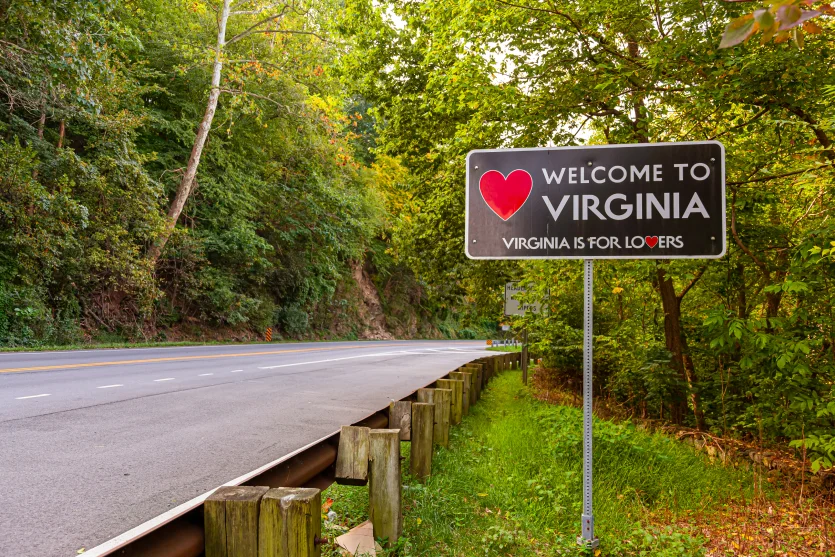
Virginia Car Insurance
Everything You Need to Know About Auto Insurance in Virginia
Virginia is not only steeped in history but also offers a diverse range of attractions for every visitor. The city of Norfolk is famous for its waterfront, neighborhoods, art galleries, and a thriving culinary scene. Charlottesville, home to the University of Virginia, is surrounded by vineyards and is a popular destination for wine enthusiasts.
For outdoor enthusiasts, Virginia boasts the Blue Ridge Mountains, perfect for hiking, camping, and scenic drives along the Blue Ridge Parkway. The state also has numerous parks, such as Shenandoah River State Park and First Landing State Park, which provide opportunities for boating, fishing, and wildlife spotting.
In addition to its natural beauty, Virginia is known for its cultural heritage. The city of Alexandria, located just outside of Washington, D.C., showcases historic architecture and cobblestone streets. Colonial Williamsburg, a living museum, transports visitors back in time to America’s colonial era, complete with costumed interpreters and restored buildings.
As you explore the wonders of Virginia, it is essential to have proper auto insurance coverage to protect yourself and others on the road. InsureOne understands the importance of protecting yourself without overspending and helps you find the best auto insurance at affordable prices. Enjoy everything that Virginia has to offer safely and confidently.
How Much Does Car Insurance Cost in Virginia?
Virginia drivers are fortunate to benefit from significantly lower average rates for car insurance compared to the national average. With an average annual cost of $1,439 for full coverage, Virginia drivers pay 29 percent less than the national average of $2,014.
Even for minimum coverage, Virginia drivers enjoy significant savings, with an average cost of $494 per year, representing a 21 percent reduction compared to the national average of $622.
Reasons Why Insurance Is So Cheap in Virginia
There are several reasons why insurance is relatively cheap in Virginia. One possible reason is that accidents tend to be less common in the state. This could be due to a variety of factors, such as better road infrastructure, stricter traffic laws, or a more cautious driving culture.
Another contributing factor could be the lower cost of living in Virginia compared to the national average. When the cost of living is lower, the overall expenses for insurance claims are also reduced. As a result, insurance rates are generally lower in states with a lower cost of living.
It’s worth noting that the frequency and severity of claims play a significant role in determining insurance rates. If there is a lower risk of accidents and claims being filed, insurance companies can offer more competitive rates to policyholders.
In summary, the relatively affordable insurance rates in Virginia may be attributed to a combination of factors such as fewer accidents, lower cost of living, and reduced claim expenses. With these lower rates, Virginians can protect themselves and their vehicles without compromising their budgets.
Affordable Car Insurance Rates Comparison by Cities in VA
Car insurance rates in Virginia can vary significantly depending on the city where you live. Like in other states, certain cities in Virginia may have lower insurance rates due to factors such as a lower cost of living or a lower likelihood of accidents. On the other hand, rates in some areas may be higher because they are more prone to claims being filed.
To provide a clearer comparison, the table below showcases the average full coverage premium for different cities in this state:
| City | Full Coverage Insurance | Liability Insurance Coverage |
|---|---|---|
| Virginia Beach | $114 | $46 |
| Chesapeake | $113 | $45 |
| Norfolk | $133 | $51 |
| Richmond | $127 | $50 |
| Newport News | $114 | $48 |
| Alexandria | $119 | $51 |
| Hampton | $101 | $35 |
| Roanoke | $104 | $38 |
| Portsmouth | $120 | $48 |
| Suffolk | $116 | $116 |
We arrive at our average auto insurance costs by using a male driver, aged 30 with a clean driving record. Minimum liability is the state-required minimum. Full coverage is a 100K/300K/100K policy. Your costs will be different and based on your individual factors.

How Much Money Can Bundling Car and Home Insurance Save You in Virginia?
Virginians have the opportunity to maximize their savings by bundling their insurance policies instead of purchasing separate plans. By bundling their various insurance needs like auto, home, and life insurance with one insurer, policyholders can save an average of 12% per year.
Furthermore, for those looking to secure the best possible deal on car insurance, we recommend following the 5 Secrets to Negotiating a Better Car Insurance Premium. Implementing these strategies can both reduce your car insurance costs and increase the value of coverage.
What Types of Auto Discounts Are Available in Virginia?
In addition to maintaining a good driving record, there are various other auto discounts available that can help lower your insurance premiums. Some of these discounts include:
- Multi-vehicle: If you have multiple vehicles insured under the same policy, you may be eligible for a discount.
- Paperless billing or automatic bill pay: Opting for paperless billing or setting up automatic bill payments can often lead to additional savings.
- Good student: Full-time students with good grades can often qualify for a discount on their car insurance premiums.
- Defensive driving course: Completing a defensive driving course can sometimes result in reduced insurance rates.
- Low mileage: If you do not drive a significant amount, you may be eligible for lower rates.
- Military: Some insurance providers offer special discounts for veterans and active military personnel.
These are just a few examples of the many potential discounts available in Virginia. Your insurance agent should assist you in identifying all the discounts available.
Virginia Car Insurance Laws
In Virginia, drivers are obligated to have a minimum amount of car insurance coverage, as is the case in most states. However, unlike many other states, Virginia provides an alternative option for drivers: they can choose to pay a $500 fee to the DMV to drive uninsured.
It is important to note that this payment does not serve as financial protection. In the event of an accident caused by an uninsured driver, they remain responsible for all associated damages and injuries. The most secure way to address these financial obligations is by having car insurance. For drivers in Virginia who opt for insurance coverage, the minimum required policy is set at 30/60/20. Here’s a closer look at what this means.
What Are the Mandatory Car Insurance Requirements in Virginia?
To drive legally in the state of Virginia, it is necessary to carry car insurance that meets the minimum liability limits outlined below.
- Bodily injury coverage: $30,000 per person
- Bodily injury coverage: $60,000 per accident
- Property damage coverage: $20,000 per accident
It is important to note that starting January 1, 2025, the state of Virginia will enforce increased liability coverage levels. For policies effective on or after that date, the minimum coverage limits will be raised to 50/100/25.
What Is the Penalty for Driving Without Insurance in Virginia?
If you have not paid the uninsured motorist fee, then you must have insurance. In Virginia, the penalty for not maintaining insurance coverage can include a noncompliance fee of $600 payable to the DMV. Additionally, your driver’s license may be suspended. To reinstate your license, you may need to pay reinstatement fees and provide proof of SR-22 insurance.
It is worth noting that Virginia takes a different approach compared to many other states, as they often impose greater penalties for subsequent offenses rather than for first-time offenders.
What Factors Does Virginia Law Allow in Determining Your Premiums?
Insurance companies consider a variety of factors when determining car insurance rates. However, even drivers who share similar characteristics can receive different quotes due to a single variation in their location or circumstances.
These factors are used because they are believed to be associated with an increased or decreased risk of accidents. For example, drivers with a history of previous accidents are considered high-risk and may face higher premiums. Common factors used by insurance companies to set rates include:
- Age
- Zip code
- Credit history
- Marital status
- Gender
- Type of vehicle
- Accident history
- Claim history
Having a good credit score, being married, and having no claims can help reduce premiums. Similarly, driving an older vehicle and exploring available discounts with your insurance agent can also lower your premiums.Here’s What You Need to Know When Driving in Virginia
In Virginia, drivers have the option to drive uninsured after making a $500 payment to the DMV. However, this is a significant risk as being at fault in an accident can lead to hefty expenses in terms of repair costs and medical bills.
If car insurance in Virginia is generally affordable, you may wonder why you are paying a high premium for your teen driver. Insurance rates for teen drivers are often higher due to their lack of driving experience and the increased likelihood of being involved in accidents.
Furthermore, a frequently asked question about auto insurance in Virginia is why car insurance rates in Norfolk are higher compared to the city of Virginia Beach, despite Virginia Beach having a larger population. This is because insurance costs are not solely based on population size. Insurance rates are influenced by multiple factors, including local driving conditions, accident rates, crime rates, and the frequency of insurance claims in a specific area.

What Is Driving Like in VA
In Virginia, various weather conditions can significantly impact driving conditions and require extra caution. Here are some of the climatic factors that can affect driving in the Old Dominion State:
- Rain: Rainfall is a common occurrence and driving in wet conditions can be hazardous. Rain reduces visibility, affects traction, and increases the risk of hydroplaning. It is essential to slow down, maintain a safe distance from other vehicles, and have properly functioning windshield wipers to ensure clear visibility.
- Snow and Ice: This state experiences winter weather conditions that can include snow and ice. These conditions can make roads slippery and reduce traction, creating challenges for drivers. It is important to drive at reduced speeds, maintain a safe distance from other vehicles, and have proper winter tires or chains when necessary.
- Fog: Dense fog can impair visibility, making it difficult to see other vehicles, road signs, and hazards. When encountering foggy conditions, it is crucial to slow down, use low beams or fog lights, and maintain a safe distance from other vehicles.
- Extreme Temperatures: Virginia can experience both extreme heat in summer and cold temperatures in winter. Extreme heat can cause tire blowouts and affect engine performance, while freezing temperatures can lead to icy roads and decreased tire traction. It is important to monitor and maintain proper tire pressure, ensure the cooling system is functioning, and be prepared for changing weather conditions.
- Thunderstorms: Thunderstorms in this region can bring heavy rain, strong winds, lightning, and potential flooding. It is crucial to avoid driving through flooded areas, stay clear of downed powerlines, and find a safe place to pull over if visibility is poor or lightning is present.
Remember, it’s always important to check weather forecasts before driving and adjust your driving behavior to accommodate the current weather conditions. Stay informed, be prepared, and drive safely with InsureOne.
How Many Car Accidents Happen in Virginia?
There were 1,005 fatalities in car crashes on Virginia roadways in 2022, making it the highest number of annual fatalities since 2007.
Of the total fatalities, there were 274 alcohol-related deaths, a 10.9% increase from the previous year. The number of pedestrian fatalities significantly rose with 171 recorded in 2022, reflecting a 36.8% increase compared to 2021. These statistics provide insight into the various factors contributing to road accidents in Virginia.
The next chart shows the number of deadly accidents in different counties and cities across Virginia that same year.
| Counties and cities | Fatal Crashes in 2022 |
|---|---|
| Albemarle County | 18 |
| Alexandria City | 5 |
| Chesapeake City | 13 |
| Danville City | 7 |
| Prince William County | 30 |
Source: Virginia Highway Safety Office
How Many Uninsured/Underinsured Motorists Are in Virginia?
In 2019, over 10.5% of drivers in this state were either uninsured or underinsured. With this high number of uninsured motorists, Virginia ranks 31st among states with an intermediate level of uninsured drivers on the road.
Nevertheless, it is crucial to remember that accidents can occur unexpectedly, and having proper insurance coverage provides peace of mind and financial protection. By maintaining auto insurance, you not only abide by Virginia state laws but also prioritize your own financial security and contribute to the well-being of the community.

Get the Best Car Insurance in Virginia Today
At InsureOne, we recognize the significance of finding the ideal auto insurance coverage without unnecessary complications. Hence, our team of knowledgeable professionals is committed to assisting you in discovering the perfect policy that fulfills all your requirements.
Obtaining a quote is simple and can be done online at your convenience. If you require additional assistance or have any inquiries, our amiable agents are just a phone call away at (800) 836-2240, or you can visit one of our convenient locations.


